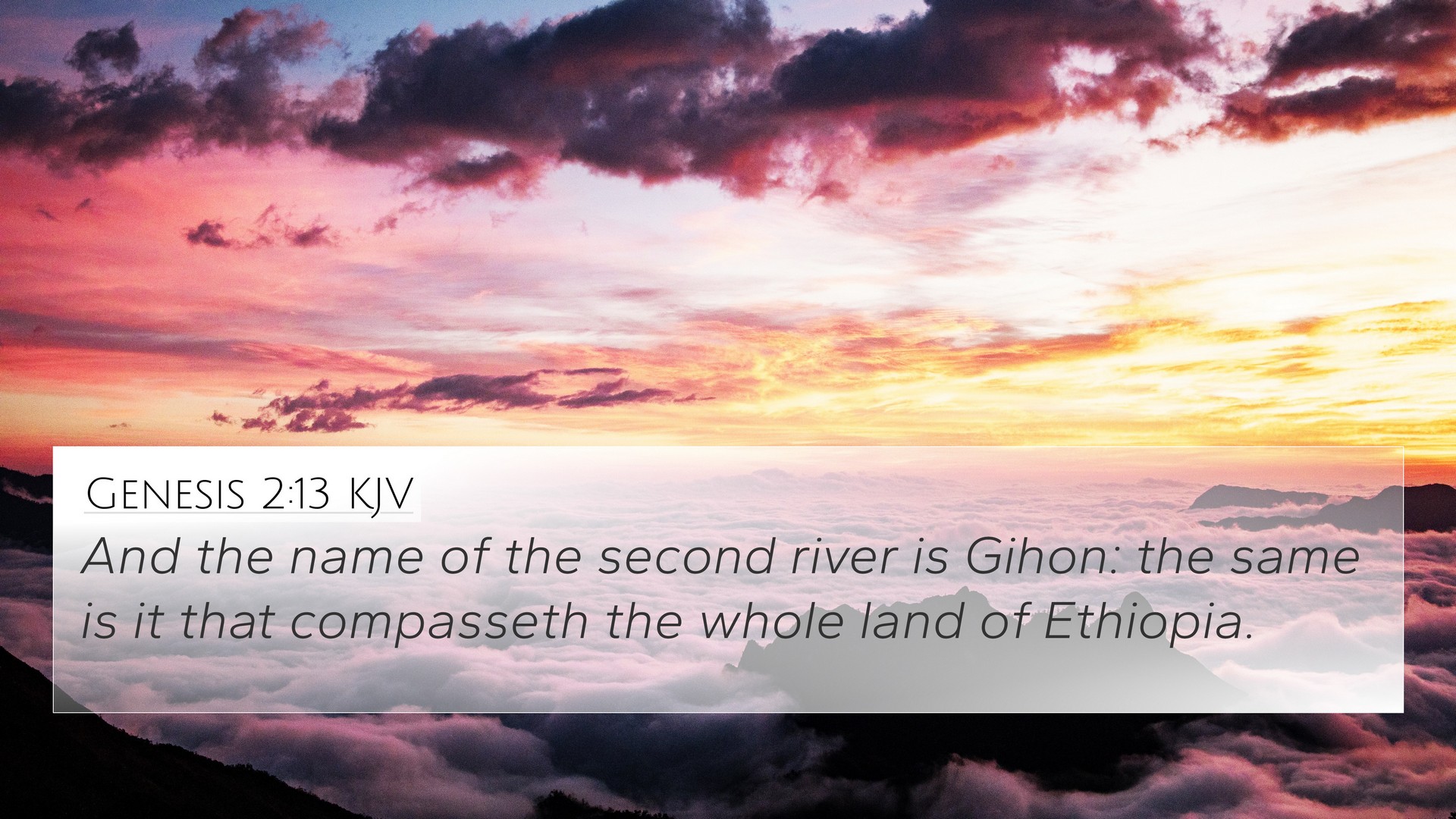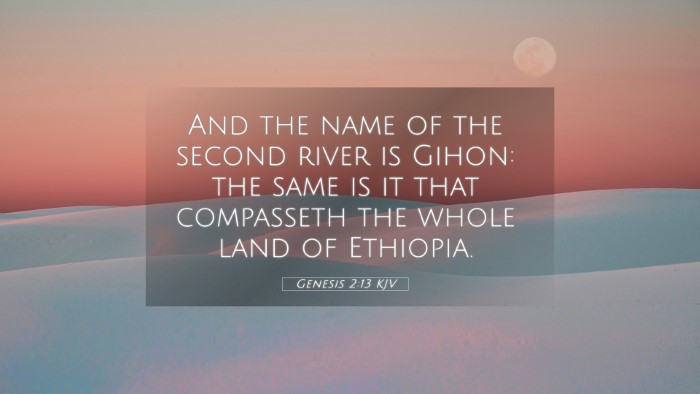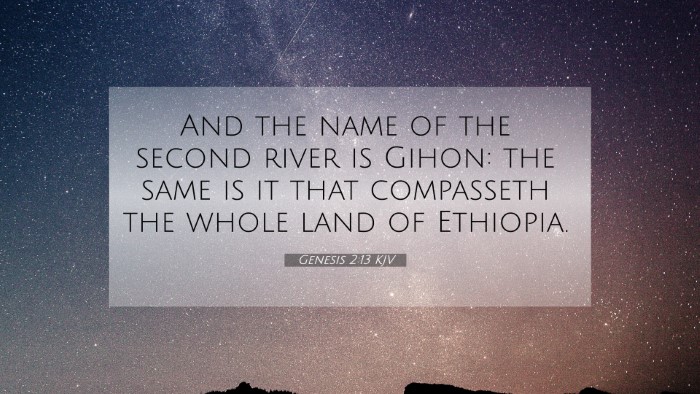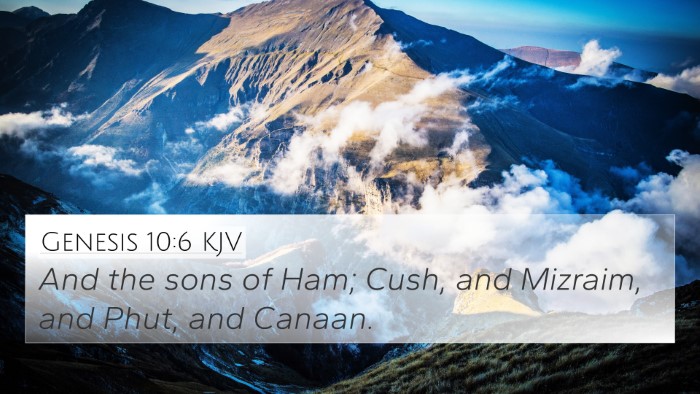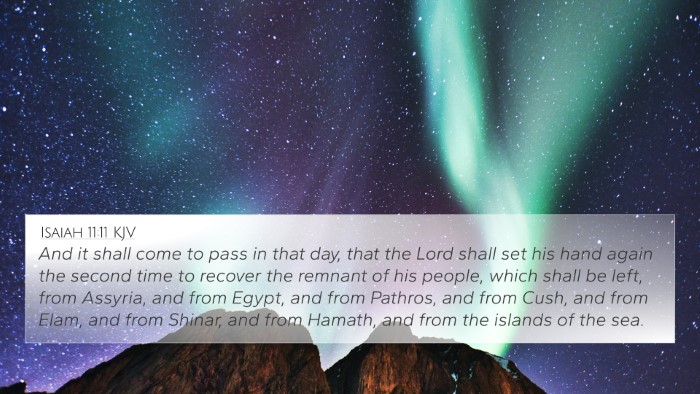Bible Verse Meaning: Genesis 2:13
Verse: Genesis 2:13 - "And the name of the second river is Gihon: the same is it that compasseth the whole land of Ethiopia."
Summary of Genesis 2:13
This verse discusses the second river mentioned in the creation narrative, Gihon, which is associated with the land of Cush, often identified with Ethiopia. The significance of these rivers is not merely geographical but has deeper theological implications as part of the Garden of Eden's creation account.
Commentary Insights
- Matthew Henry: Matthew Henry emphasizes the importance of the geographical boundaries set by the rivers, which not only served as natural landmarks but also contributed to the theological narrative of God’s creation. The mention of Cush evokes associations with the descendants of Ham, highlighting the diverse nations emerging after the Flood.
- Albert Barnes: Albert Barnes expounds on the symbolic meanings of the rivers, interpreting them as representations of life and fertility. He suggests that these rivers serve as a contrast to the arid wilderness surrounding them, illustrating God's provision for Adam and Eve in the Garden of Eden.
- Adam Clarke: Adam Clarke offers insight into the cultural significance of Ethiopia during biblical times, noting that this mention reflects the early knowledge of the world as understood by its authors. He implies that this connection emphasizes God's universal plan for all nations through the lineage of Adam and Eve.
Thematic Connections to Other Scriptures
Genesis 2:13 is a pivotal verse that has thematic connections with several other scriptures, enhancing our understanding of biblical geography, creation, and humanity’s origins:
- Genesis 1:26-28: This creation account highlights human dignity and the divine mandate given to humankind, underscoring the significance of the land that rivers like Gihon flow through.
- Genesis 4:16: Cain’s exile to the land of Nod reflects the expanse of geographical regions and nations that arise from the early antediluvian families.
- Isaiah 18:1: The mention of Cush in prophetic literature shows that the regions described in Genesis hold a lasting significance, linking the creation account to future nations.
- Acts 8:27: The Ethiopian eunuch's conversion encapsulates the long-standing interaction between the Jewish faith and African lands, tying back to the narrative thread originating in Genesis.
- Psalm 68:31: This verse refers to Cush as a people who will bring tribute, emphasizing the economic and cultural connections through the references made in Genesis.
- Matthew 2:15: Joseph fleeing to Egypt with Mary and Jesus ties into the broader theme of God’s guidance through uncertain times, mirroring the journey of the descendants of Adam.
- Jeremiah 13:23: This verse illustrates the transformations of people and nations, drawing a line back to the genealogies and locations established in Genesis 2:13.
Cross-References and Related Themes
Genesis 2:13 provides a foundation for various thematic Bible verse connections that reinforce the narrative of creation and God’s sovereignty over nations:
- Genesis 10:6-7: Discusses the descendants of Ham, including Cush, offering a genealogical framework to understand the regions referred to in Genesis 2:13.
- Isaiah 11:11: References the recovery of the remnant of his people from various nations, illustrating God's comprehensive plan for humanity, starting from Eden.
- Revelation 21:24: Envisions nations coming to God, suggesting that the origins of these nations trace back to the early biblical accounts.
- Ezekiel 30:4: Mentions Cush in a prophetic context, linking back to the diverse peoples of the world that stem from the creation narrative.
Connecting Themes Through Cross-Referencing
In understanding Genesis 2:13, it is vital to engage in scriptural cross-referencing which allows for a comprehensive study of the Bible:
- Bible concordance: A tool that assists in identifying keywords like 'Gihon' and 'Cush' across various biblical texts.
- Bible cross-reference guide: Helps to link passages that share common themes, such as creation and the formation of nations.
- Bible reference resources: Can aid students and scholars in tracing thematic arcs throughout Scripture, focusing on Genesis 2:13.
- Cross-reference Bible study: Methods to study the interconnectedness of scriptures enhance the understanding of biblical narratives.
Conclusion
Genesis 2:13 stands as a significant verse that connects the early biblical narratives with later theological themes and historical developments. Understanding its implications through thorough comparative Bible verse analysis illuminates the rich tapestry of Scripture and God’s unfolding plan for humanity.
Whether you are exploring how to find cross-references in the Bible or seeking to understand specific connections between verses, deep engagement with the texts opens up broader insights into the nature of God and His relationship with His creation.
